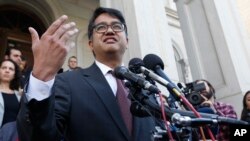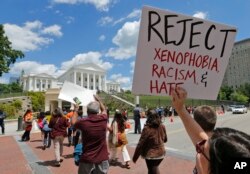A much-challenged temporary travel ban issued by President Donald Trump faced another day in court Monday, with federal appellate judges grilling lawyers on both sides to determine whether a suspension of the executive order will be upheld.
An attorney for the government argued before a panel of 13 judges from the Fourth U.S. Circuit Court of Appeals in Richmond, Virginia, that the Trump administration's second attempt to curb travelers and immigrants from some majority-Muslim countries for three months was constitutional and within the president's purview.
“This is not a Muslim ban. Its text doesn't have to anything to do with religion. Its operation doesn't have anything to do with religion,” Acting Solicitor General Jeffrey B. Wall told the appeals court.
The court, which did not immediately issue a ruling Monday, repeatedly questioned Wall about the relationship between the executive order and comments made by Trump before his inauguration about blocking Muslim travelers and immigrants to the United States.
A statement supporting the “total and complete shutdown of Muslims entering the United States” that remained on Trump's campaign website from Dec. 7, 2015, was removed Monday, though it is unclear if that followed questions for White House Spokesman Sean Spicer during an afternoon news conference about why the statement remained online, or whether it came during or after the hearing in Richmond. An archived version remains online.
In March, a federal judge in Maryland blocked the travel ban, which itself was a revised version of one initially issued in January that was tweaked after encountering legal roadblocks. Plaintiffs in the case allege in part that the order discriminates against one religion, in violation of the Constitution.
'Doesn't get a blank check'
Omar Jadwat, an attorney for the American Civil Liberties Union, argued on behalf of the plaintiffs on Monday that Trump's directive is discriminatory, and that the president's statements before January are evidence of his intent to target Muslims.
“There's no question that the president has authority — he has vast authority — but the president also doesn't get a blank check to violate the Constitution,” Jadwat told reporters outside the courthouse, in a news conference streamed online by the ACLU.
“We have prevailed thus far, and I think that at the end of the day the ban will be struck down,” he added.
It is unclear when the 4th Circuit judges will make a ruling.
The Ninth U.S. Circuit Court of Appeals will hear arguments in another challenge to the March travel order, which ordered a temporary stop to refugee arrivals, in Seattle on May 15.





